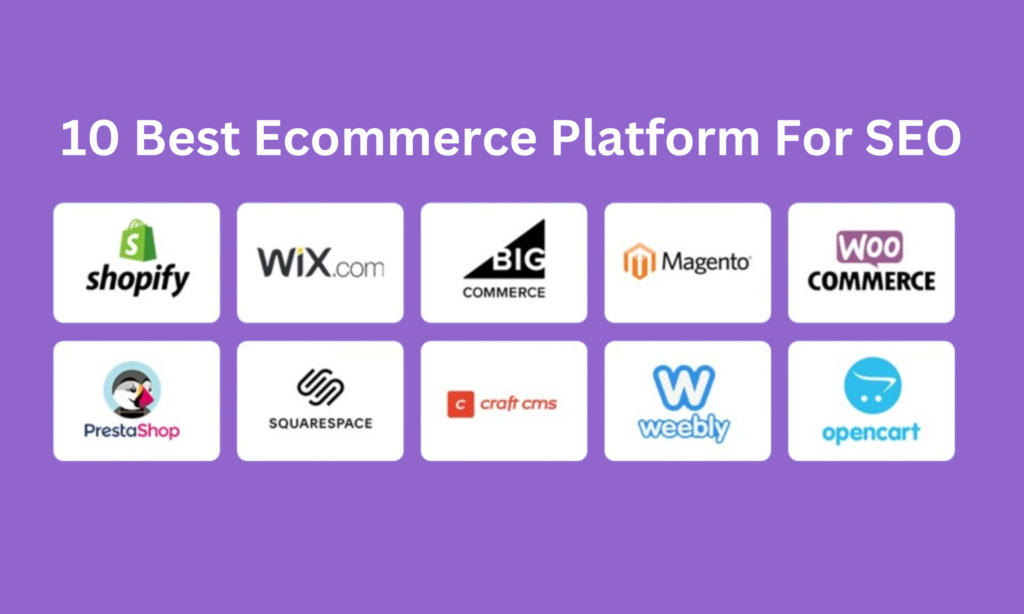In today’s digital landscape, selecting the right eCommerce platform is crucial for the success of your online business. One of the most important factors to consider is how well the platform supports Search Engine Optimization (SEO). Effective SEO can significantly boost your website’s visibility, drive organic traffic, and ultimately increase sales. In this comprehensive guide, we’ll explore the top 10 eCommerce platforms that excel in SEO capabilities. We’ll provide detailed reviews of each platform, highlighting their strengths and weaknesses to help you make an informed decision.

How to Choose the Best E-commerce Platform for SEO
Selecting the best eCommerce platform for SEO involves several crucial steps. Here’s a step-by-step guide to help you make the right choice:
Identify Your SEO Needs
Determine your specific SEO requirements based on your business size, industry, and growth plans. Consider factors like the number of products, target audience, and content strategy.
Evaluate SEO Features
Look for platforms offering essential SEO features like customizable meta tags, SEO-friendly URLs, XML sitemaps, schema markup, and alt text for images. Ensure these tools are easy to use and effective.
Check Site Speed and Performance
Opt for platforms known for their fast loading times and reliable performance. Site speed significantly impacts SEO and user experience.
Ensure Mobile Optimization
Choose a platform that provides responsive design templates and mobile-specific SEO features. Mobile optimization is critical due to the increasing number of mobile users.
Assess Ease of Use
The platform should be user-friendly, allowing you to manage SEO without extensive technical knowledge. Look for intuitive interfaces and comprehensive support documentation.
Consider Scalability
Ensure the platform can grow with your business, handling increased traffic and larger product catalogs without compromising SEO.
Review Customization and Flexibility
Opt for a platform that allows high customization to tailor your SEO strategy. Open-source platforms typically offer more flexibility.
Look for CMS Integration
A good CMS is vital for managing content, a key part of SEO. Platforms that integrate well with CMS like WordPress offer robust content management features.
Check Technical Support and Community
Reliable support and a strong community are essential for troubleshooting SEO issues and staying updated with SEO practices.
Analyze Costs
Consider the overall cost, including subscription fees, transaction fees, and additional costs for SEO tools. Ensure the platform provides good value for money.
Top 10 eCommerce Platforms for SEO
- Shopify
- Wix
- BigCommerce
- Magento
- WooCommerce
- PrestaShop
- Squarespace
- Craft CMS
- Weebly
- OpenCart
1. Shopify
Shopify is one of the leading eCommerce platforms known for its ease of use and robust SEO features. It offers a variety of SEO tools, including customizable title tags, meta descriptions, and URL structures. Shopify also integrates seamlessly with various SEO apps to enhance your site’s performance.

Best for:
Small to medium-sized businesses looking for an intuitive platform with strong SEO capabilities.
Pros:
- User-friendly interface
- Excellent SEO tools and integrations
- Fast loading times
Cons:
- Limited customization options compared to other platforms
- Monthly fees can add up
Pricing:
Starts at $29 per month
2. Wix
Wix is a popular website builder that includes powerful eCommerce capabilities. It provides a range of SEO tools, such as customizable meta tags, SEO-friendly URLs, and an intuitive SEO wizard. Wix is perfect for small businesses and individuals looking for a simple solution to create an SEO-optimized online store.
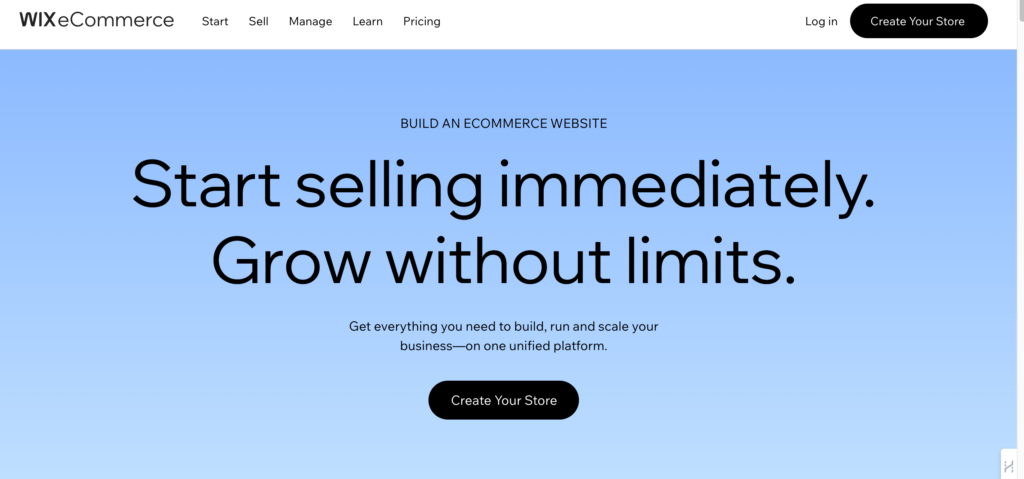
Best for:
Small businesses and individuals want an easy-to-use platform with solid SEO tools.
Pros:
- User-friendly interface
- Integrated SEO tools
- No technical skills required
Cons:
- Limited scalability
- Fewer advanced features compared to other platforms
Pricing:
Starts at $23 per month for the Business Basic plan
3. BigCommerce
BigCommerce is a robust eCommerce platform that offers advanced SEO features out of the box. It includes SEO-friendly URLs, built-in microdata, and customizable robots.txt files. BigCommerce also provides excellent site speed and uptime, contributing to better SEO performance.

Best for:
Medium to large-sized businesses need a scalable and SEO-optimized platform.
Pros:
- Advanced SEO features
- Scalable platform
- Excellent site speed and uptime
Cons:
- Higher cost compared to some other platforms
- May require some technical skills for advanced customization
Pricing:
Starts at $29.95 per month
4. Magento
Magento is a powerful open-source eCommerce platform known for its flexibility and scalability. It offers comprehensive SEO features, including customizable URLs, meta tags, and sitemaps. Magento’s advanced capabilities make it a preferred choice for large enterprises with complex SEO needs.
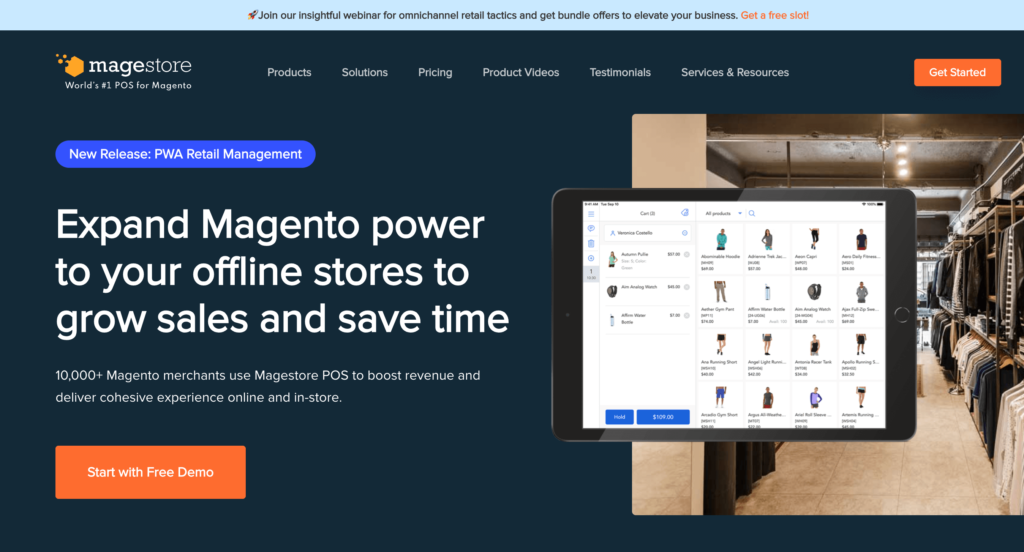
Best for:
Large enterprises seeking a highly customizable and scalable eCommerce solution.
Pros:
- Highly customizable
- Extensive SEO features
- Scalable for large businesses
Cons:
- Requires significant technical expertise
- High hosting and maintenance costs
Pricing:
Free (Open Source), Enterprise pricing varies
5. WooCommerce
WooCommerce is a WordPress plugin that transforms your website into a powerful eCommerce store. It leverages the SEO strengths of WordPress, providing extensive customization options and a wide range of plugins to boost your SEO efforts. WooCommerce is highly flexible, allowing you to create a tailored SEO strategy.
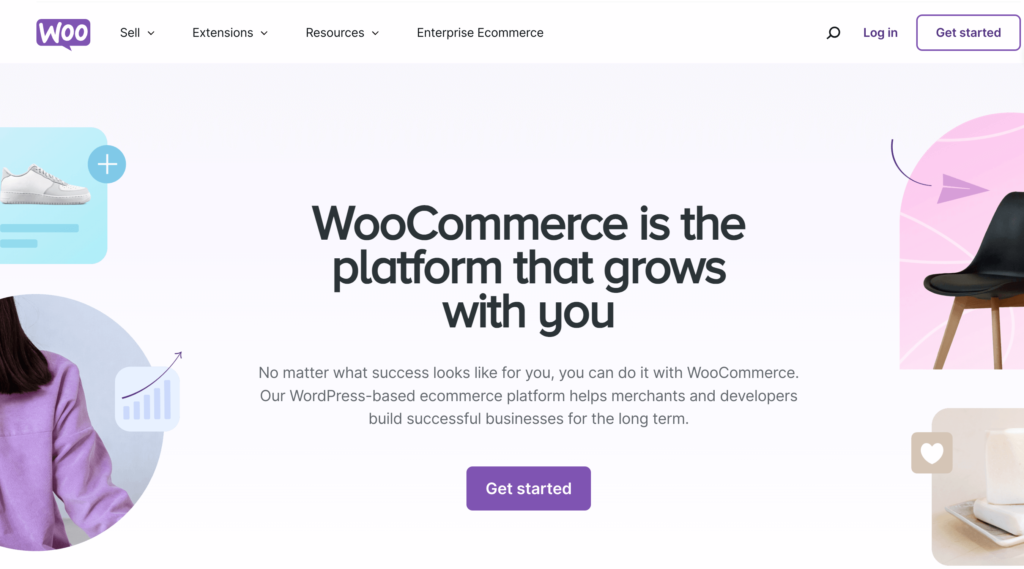
Best for:
Businesses already using WordPress who want a customizable and SEO-friendly eCommerce solution.
Pros:
- Highly customizable
- Extensive plugin library
- Strong SEO capabilities
Cons:
- Requires some technical knowledge
- Can be resource-intensive
Pricing:
Free (additional costs for hosting and premium plugins)
6. PrestaShop
PrestaShop is an open-source eCommerce platform that offers a high level of customization and flexibility. It includes robust SEO features, such as customizable URLs, meta tags, and rich snippets. PrestaShop is best suited for businesses with technical expertise looking for a customizable and SEO-friendly solution.
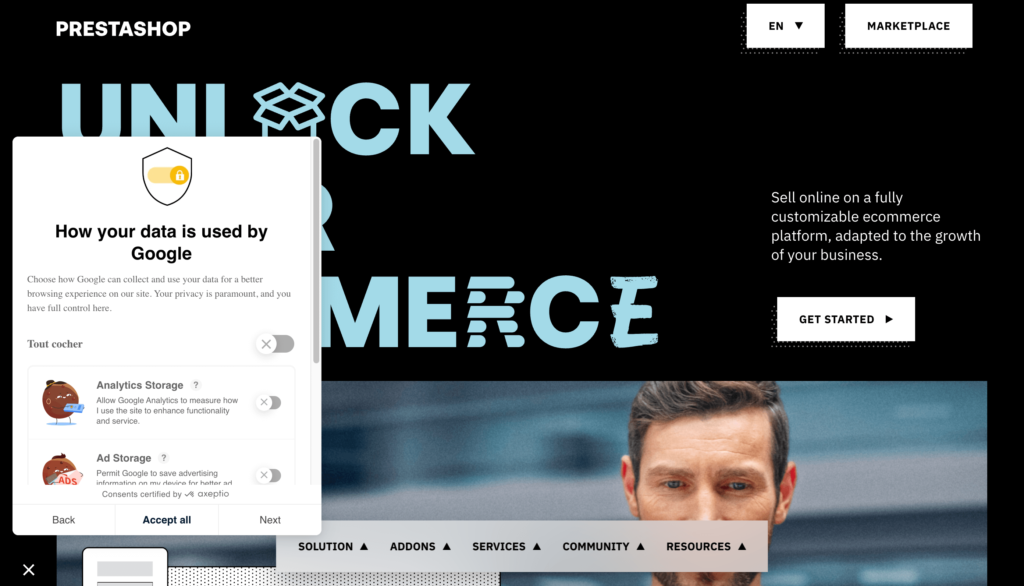
Best for:
Businesses with technical expertise seeking a highly customizable and SEO-optimized platform.
Pros:
- Highly customizable
- Robust SEO features
- Open-source
Cons:
- Requires technical knowledge
- Potential for higher maintenance costs
Pricing:
Free (additional costs for hosting and modules)
7. Squarespace
Squarespace is a popular website builder that includes eCommerce functionality. It offers a range of SEO features, including customizable meta tags, clean URL structures, and integrated analytics. Squarespace is known for its beautiful design templates, making it a great choice for visually-oriented businesses.
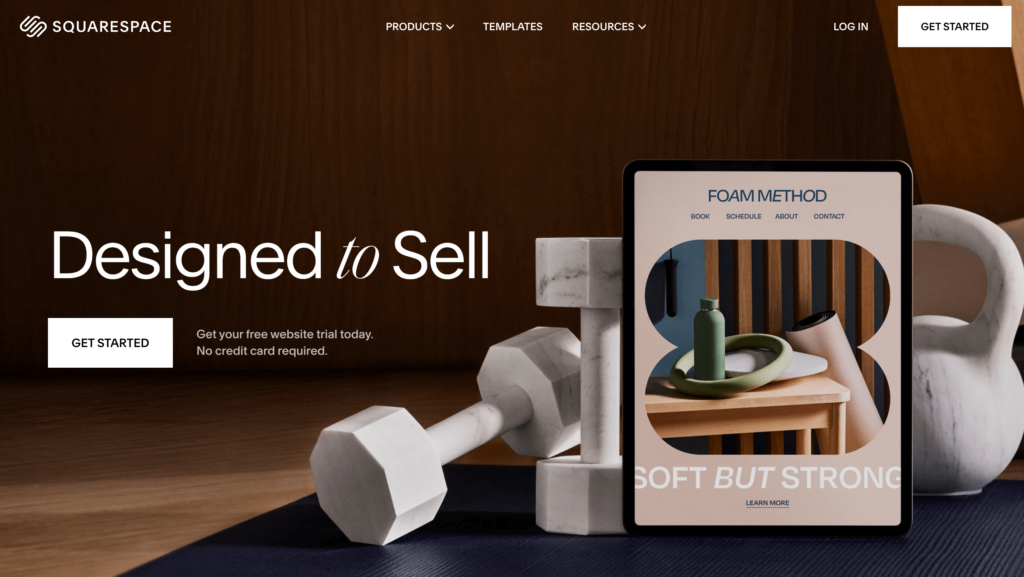
Best for:
Creatives and small businesses looking for a visually appealing and SEO-friendly eCommerce platform.
Pros:
- Beautiful design templates
- Integrated SEO tools
- Easy to use
Cons:
- Limited customization options
- Higher pricing compared to some other platforms
Pricing:
Starts at $26 per month for the Basic Commerce plan
8. Craft CMS
Craft CMS is a highly customizable content management system that includes eCommerce capabilities through plugins like Craft Commerce. It offers extensive SEO tools, including customizable meta tags, SEO-friendly URLs, and rich content editing. Craft CMS is ideal for developers and businesses seeking a flexible and powerful SEO solution.
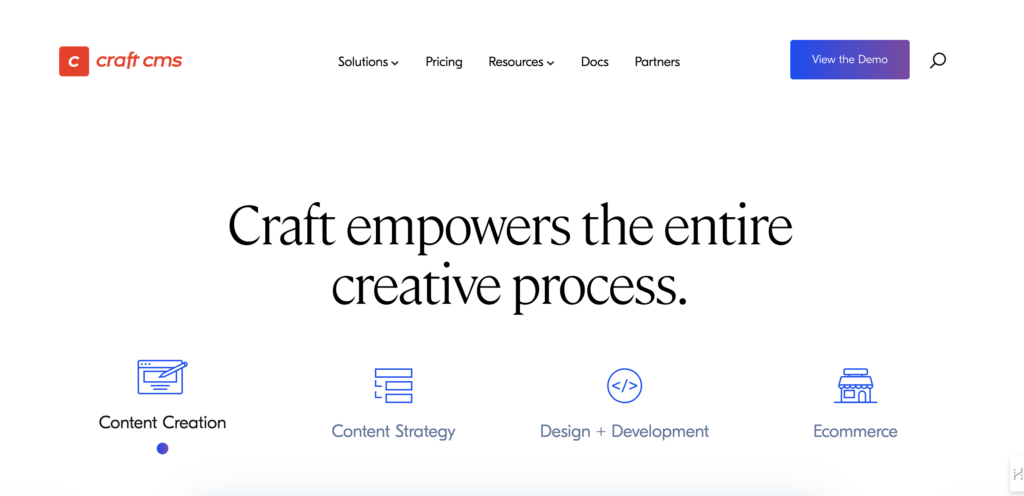
Best for:
Developers and businesses need a highly customizable and powerful SEO-friendly platform.
Pros:
- Highly customizable
- Extensive SEO tools
- Powerful content management
Cons:
- Requires technical expertise
- Higher setup and maintenance costs
Pricing:
Craft CMS starts at $299 per project, with additional costs for Craft Commerce
9. Weebly
Weebly is a user-friendly website builder that includes eCommerce functionality. It offers basic SEO tools, such as customizable meta tags, SEO-friendly URLs, and a simple interface for managing your online store. Weebly is ideal for small businesses and individuals new to eCommerce.
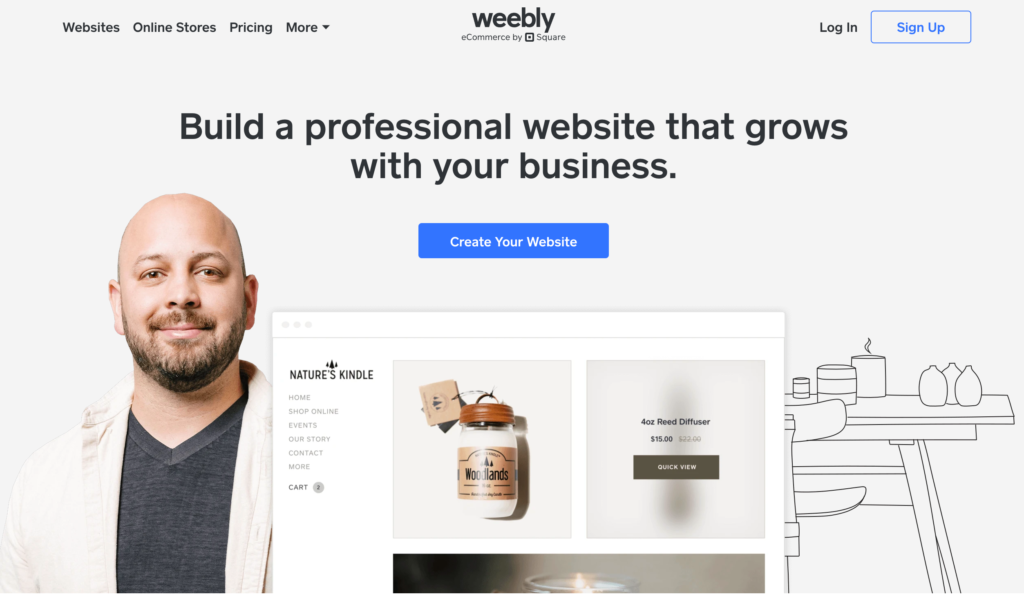
Best for:
Small businesses and individuals new to eCommerce looking for an easy-to-use platform.
Pros:
- User-friendly interface
- Basic SEO tools
- Affordable pricing
Cons:
- Limited advanced features
- Not as scalable as other platforms
Pricing:
Starts at $12 per month for the Pro plan
10. OpenCart
OpenCart is an open-source eCommerce platform known for its simplicity and ease of use. It includes essential SEO features such as customizable meta tags, SEO-friendly URLs, and a wide range of extensions to enhance SEO. OpenCart is suitable for small to medium-sized businesses looking for a straightforward eCommerce solution.
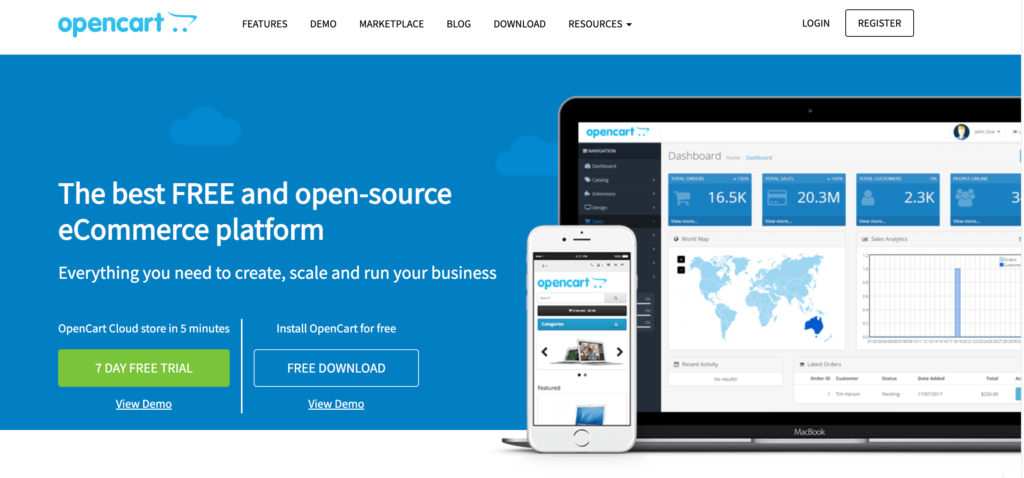
Best for:
Small to medium-sized businesses need a simple and effective e-commerce platform.
Pros:
- Easy to use
- Open-source and free
- Good range of SEO features
Cons:
- Limited scalability
- Requires technical knowledge for advanced customization
Pricing:
Free (additional costs for hosting and extensions)
Conclusion
Selecting the right eCommerce platform is key to your online business’s success, especially for SEO. Each platform reviewed offers unique strengths for different business needs. Shopify and WooCommerce are user-friendly with strong SEO tools, while BigCommerce and Magento are ideal for larger businesses. Consider your business size, technical expertise, and SEO goals when making your choice to improve your search engine rankings and drive organic traffic.
What is the best eCommerce platform for SEO?
Answer: It depends on your needs. Shopify and WooCommerce are great for their SEO tools and ease of use. BigCommerce and Magento are best for larger businesses.
How does an eCommerce platform affect SEO?
Answer: Platforms provide SEO tools like customizable meta tags, SEO-friendly URLs, and fast loading times to improve search engine rankings.
Can I use a website builder for an eCommerce store and still have good SEO?
Answer: Yes, builders like Wix and Squarespace offer good SEO tools, though they may have some limitations compared to specialized platforms.
Is WooCommerce good for SEO?
Answer: Yes, WooCommerce is excellent for SEO, leveraging WordPress’s strengths and offering many plugins.
Are there free eCommerce platforms that are good for SEO?
Answer: Yes, WooCommerce (with WordPress) and PrestaShop are free and offer robust SEO features, but you might incur hosting and plugin costs.
How important is site speed for eCommerce SEO?
Answer: Very important. Fast site speed improves user experience and search rankings. Platforms like BigCommerce and Shopify excel in this area.
Do I need technical knowledge to optimize my eCommerce site for SEO?
Answer: Some platforms like Shopify and Wix are user-friendly. Others like Magento and PrestaShop require more technical expertise.
Can I switch eCommerce platforms without losing my SEO rankings?
Answer: Yes, with careful planning, such as setting up 301 redirects and maintaining your URL structure.
Which eCommerce platform is best for large enterprises?
Answer: Magento and BigCommerce are best due to their scalability and advanced features.
How do customizable URLs benefit SEO?
Answer: They create clean, descriptive URLs that are easier for search engines to rank and improve user experience.

